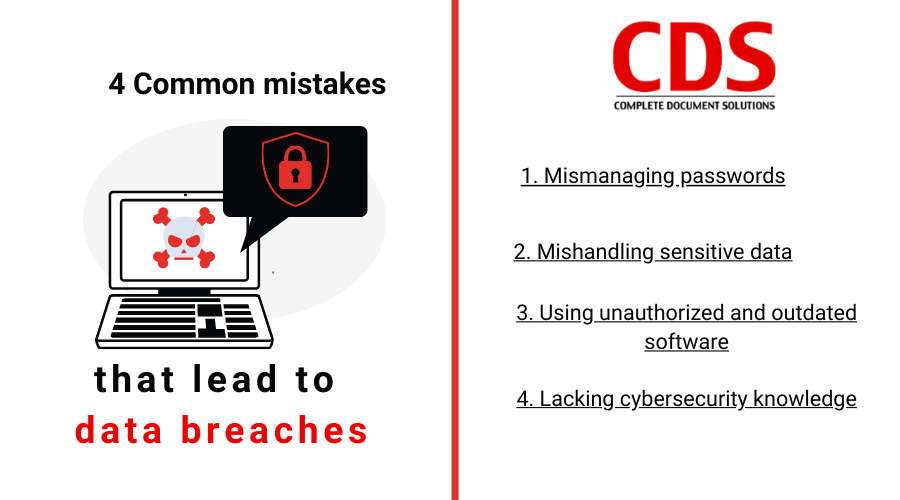Data breaches caused by malicious attacks not only disrupt your company's operations, but it also leads to financial loss. According to IBM Security's Cost of a Data Breach Report 2020, the average cost of data breaches in the United States is $8.64 million.
Businesses are enhancing their cybersecurity defenses to keep hackers at bay, but sometimes human errors still cause a data breach. In fact, according to Verizon's 2019 data breach report, 21% of data breaches that occurred in 2018 resulted from human error.
Common mistakes that lead to data breaches
Here are the major mistakes employees commit that lead to a data breach:
1. Mismanaging passwords
A password is the first line of defense against unauthorized access to your company's vital assets. However, employees take the importance of using strong passwords for granted. Many people find complex passwords difficult to memorize and settle for easy-to-remember passwords such as "password," "august191980," and "1234567," to name a few. Most people don't realize that it's easy for cybercriminals to guess weak passwords using a brute force attack.
However, having a strong, complex password is not enough to reduce the risk of a data breach. Unfortunately, many users list down their passwords on sticky notes and leave them in the open where others can see or steal them. In addition, some employees even share passwords through unsecured messaging apps without encrypting them first.
Another password mistake employees often commit is using the same password for multiple accounts. Once stolen, that single password will allow hackers to access various company resources that contain data they can use to commit fraud or sell on the dark web.
2. Mishandling sensitive data
Employees work with a lot of sensitive data, and minor mistakes can cause a major security breach. Tiredness, negligence, and lack of cybersecurity knowledge can cause your staff to mishandle sensitive information. Your employees can:
- Accidentally delete files containing important information
- Send emails containing private information to the wrong person
- Forget to back up critical data
- Make unintentional alterations to documents
3. Using unauthorized and outdated software
Outdated and unauthorized software is a cybercriminal's best friend because it has bugs and vulnerabilities that can be easily exploited. Outdated software is often the result of employees ignoring or failing to install the necessary updates and patches.
In addition, using software that hasn't been approved by your IT staff or managed IT services provider (MSP) can also compromise your security. Unauthorized software may contain malware that can steal private information, damage network resources, and even prevent users from logging in and accessing the applications they need to perform their tasks.
4. Lacking cybersecurity knowledge
Employees who lack knowledge of or are unaware of cybersecurity best practices can increase your risk of a cyberattack by:
- Opening links and attachments on suspicious emails
- Using personal devices at work without authorization
- Accessing public Wi-Fi without a virtual private network
- Disabling security features in computers and laptops
- Using unauthorized external storage devices such as USBs and external hard drives
How to minimize the frequency of human error
The good news is that cybersecurity breaches caused by human error can be avoided by implementing a cybersecurity strategy that includes:
1. Educating employees on cybersecurity threats and best practices
One of the best defenses against a cybersecurity breach is educating your employees about important cybersecurity practices and threats. Conduct drills to see how your employees react to various scenarios such as phishing scams and ransomware attacks. Post reminders throughout your facility about the proper ways of handling sensitive information and healthy password practices.
2. Implementing the principle of least privilege
Implementing the principle of least privilege provides your employees access to only the resources they need to complete their tasks. This helps minimize the risk of a data security breach and accidental data deletion.
Data breaches resulting from human error pose a serious threat to your company's sensitive information and business-critical processes. To prevent these from happening, partner with a reliable MSP like Complete Document Solutions. Our proactive network monitoring services will minimize security threats and keep your valuable data safe 24/7/365. Call us today to learn more.




Leave a comment!